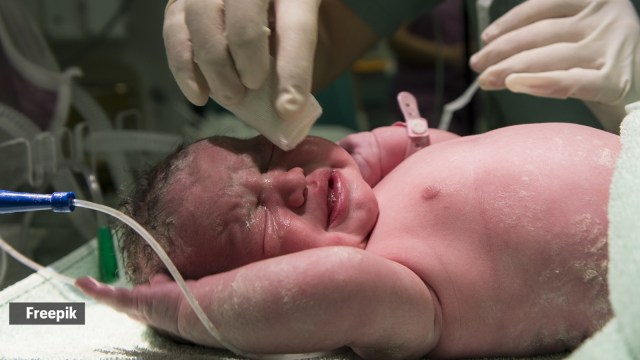
Then there are families who request delivery before a specific time, often guided by elders or astrologers. “It’s very common and it’s on the rise over the last couple of years,” said Dr Manjusha Goel, lead consultant, obstetrics and gynaecology, CK Birla Hospital, Delhi.
What makes caesarean muhurat possible?
Normal deliveries are unpredictable and therefore cannot be fixed to a muhurat. “Only caesarean deliveries can be tailored as per muhurat,” explained Dr Goel. “If a patient is heading for a normal delivery and we feel vitals are good, most families are receptive — unless it’s a ‘bad’ time like shraadh, when they might request an early C-section within an auspicious window.”
Families now increasingly consult astrologers before fixing dates. “I have observed this trend growing stronger with time,” said Dr Monica Chopra, dentist-turned-clairvoyant and founder of Aananda – The Healing Hub and Aananda Crystals.
The numbers reflect the broader rise in C-sections: from 17.2 per cent in 2015–16 (NFHS-4) to 21.5 per cent in 2019–21 (NFHS-5), with private hospital rates even higher.
The psychology of choosing a date
For many, scheduling a C-section is about reassurance. “If one cannot control destiny, at least one can welcome their child under the most positive energy possible,” said Dr Chopra.
Story continues below this ad
Delnna Rrajesh, psychologist, relationship coach, numerologist and a karmic healer, sees it as a need for control. “Choosing a date provides parents with a sense of agency in a situation otherwise ruled by uncertainty,” she said. For centuries, Indian families have turned to muhurats for weddings, housewarmings, and business ventures. Extending that to childbirth, “feels natural”, said Rachit Dua, astrologer and a palmist.
“People often look for the best muhurat when it comes to marriage or buying a vehicle. So, when it comes to bringing a new life into the world, it is only natural for parents to want it to happen at the most auspicious time. This is why, finalising the date and time for C-section deliveries has become a growing trend not just for astrologers, but also as a revenue model for many hospitals,” said Dua.
Delnna noted deeper emotional drivers too:
– Fear of “not being enough”: Parents wonder if they’re doing everything possible.
– Societal pressure: Relatives or doctors may reinforce the belief that an auspicious date ensures success.
Story continues below this ad
– Guilt vs. control: In uncertain times, a scheduled birth gives the illusion of control.
 Here’s what you need to keep in mind (Photo: Freepik)
Here’s what you need to keep in mind (Photo: Freepik)
The medical risks
Doctors emphasise that babies should remain in the womb until at least the 39th week, so vital organs like lungs, brain, and liver are fully developed. Early elective deliveries can pose risks.
Families often request specific timings — even down to the minute. “People sometimes come asking for 12.24,” said Dr Goel. “We tell them to keep a window of time, because we cannot compromise medical safety.”
Odd hours are especially unsafe. “It is bad and risky to do elective surgeries at night or early morning, say 2–3 am, due to concerns like high blood pressure,” Dr Goel warned. She recalled a patient who insisted on a 4 am muhurat despite obesity-related risks. “Even a gynaecologist herself wouldn’t relent,” she said. “At odd hours, staff and infrastructure may also be inadequate for elective procedures.”
Story continues below this ad
Tradition versus safety
Dr Chopra traced the practice back to mythology, citing Ravana’s attempt to manipulate planetary positions for his son Meghanada’s birth — only to be thwarted by Saturn. “It was a reminder that planetary positions and destiny are beyond human control,” she said.
She advises families to treat astrology as a support, not a substitute. “Even a ‘less-favourite’ number on a safe natural birth carries more blessing than a risky ‘favourite’ number forced against medical wisdom,” added Delnna.
Celebrity astrologer Parduman Suri echoed this: “The astrological chart can be created any time before a child turns nine years old. The priority should always be the well-being of mother and child.”
Are certain timings better than others?
Dr Chopra said that she is mindful of certain timings, especially around childbirth. “If Gandmool can be avoided, it is preferable. I also explain that while normal delivery strengthens a baby as they struggle to be born, C-section babies don’t undergo that struggle and may sometimes have slightly weaker immunity. Yet, I lovingly call them “miracle babies,” because their upper chakras are highly active. They tend to be intuitive, sensitive, and naturally receptive to spiritual guidance,” claimed Dr Chopra.
Story continues below this ad
Why are dates 1/3/5/6 popular drivers?
According to Delnna, they carry qualities families naturally cherish:
– 1 leadership, authority, power
– 3 intellectual creativity, wit, cheerfulness/light-heartedness, teacher/ coach
– 5 adaptability, agility, intelligence, communication
– 6 harmony, love, luxury
How hospitals are responding
Some hospitals now charge a premium for caesarean muhurat requests. “Most have put a cap of 25 per cent extra charges. It’s not about earning, but when families feel the pinch, they often opt out. If charges were removed, demand would grow exponentially,” said Dr Goel.
Dr Tripti Raheja, director, obstetrics and gynaecology, CK Birla Hospital, cautioned: “Childbirth should not be fitted into a calendar. Even a few hours’ delay can make the difference between a safe outcome and a complication.”
 Heed to medical advice (Photo: Getty Images/Thinkstock)
Heed to medical advice (Photo: Getty Images/Thinkstock)
The sacred balance: Medicine first, charts later
Doctors and psychologists agree: medicine must come first, astrology later. “Real safety — maternal and neonatal — is the most auspicious muhurat,” said Delnna.
Story continues below this ad
As Dr Chopra summed up, “Caesarean muhurat is not about superstition, it is about reassurance. As long as medical expertise is prioritised, astrology can be a supportive guide, where modern practicality and traditional wisdom walk hand in hand.”



 Here’s what you need to keep in mind (Photo: Freepik)
Here’s what you need to keep in mind (Photo: Freepik) Heed to medical advice (Photo: Getty Images/Thinkstock)
Heed to medical advice (Photo: Getty Images/Thinkstock)

























